How To Socialize An Older Dog – Tips And Advice
How to socialize an older dog is a guide to socializing adult dogs. In an ideal world every Labrador puppy will have a perfect start in life. And every dog ever born will be thoroughly socialized as a puppy.
Socialization is the process that dogs need to pass through in order to become friendly and well adjusted. It’s all about learning not to be scared of ordinary everyday things that happen around them. But in the real world things are not always as perfect as we’d like. Some older dogs were never socialized properly as puppies. And they need someone like you to help them through this process later in life.
Why some older dogs are not socialized
There are a number of reasons why some older dogs miss out on the socialisation process including
- Ignorance
- Fear of infection
- Abandonment
- Wanting an aggressive dog
Some dog owners do not know how to socialize their puppy. While all good puppy books, reputable breeders, and websites like this one do put out extensive information on socialising puppies, it doesn’t reach everyone.
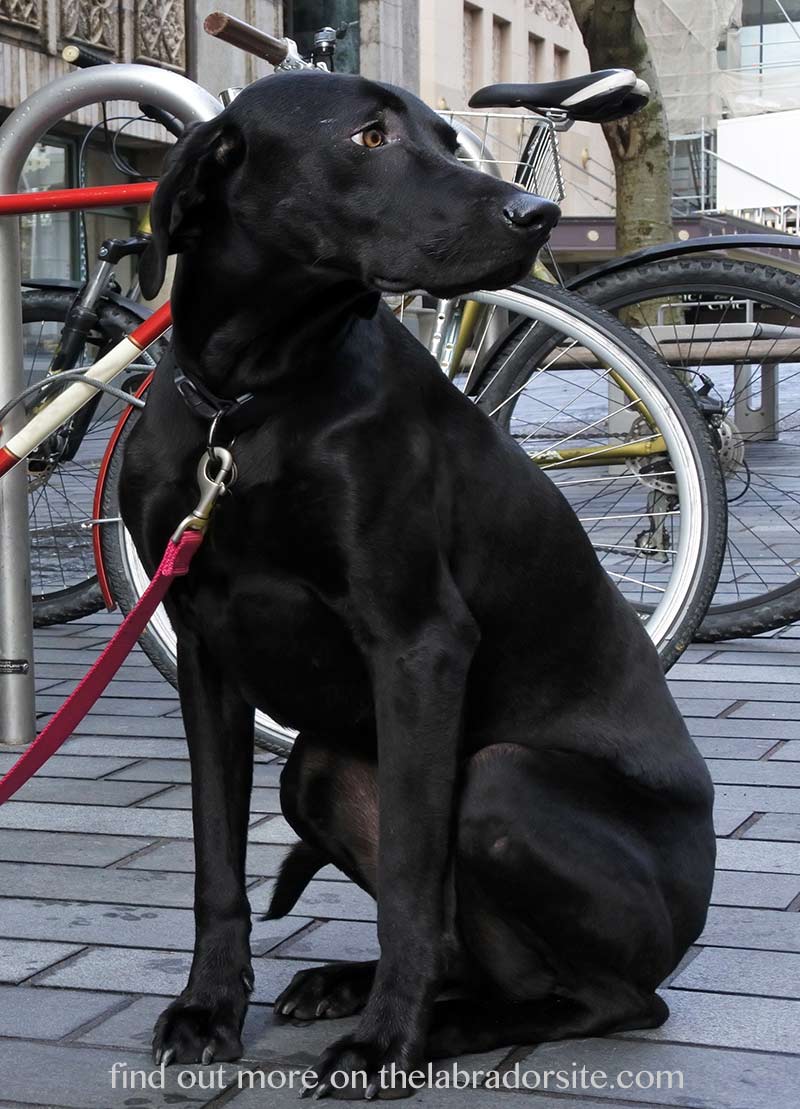
Some people are still unaware of how important socialisation is, or even that it exists at all. Many people are confused by instructions to ‘keep puppies at home’ until fully vaccinated. They feel torn between the need to keep their puppy safe from disease and the need to introduce him to lots of new experiences. Erring on the side of caution can have challenging consequences, especially for dogs that have a tendency to be more cautious or nervous.
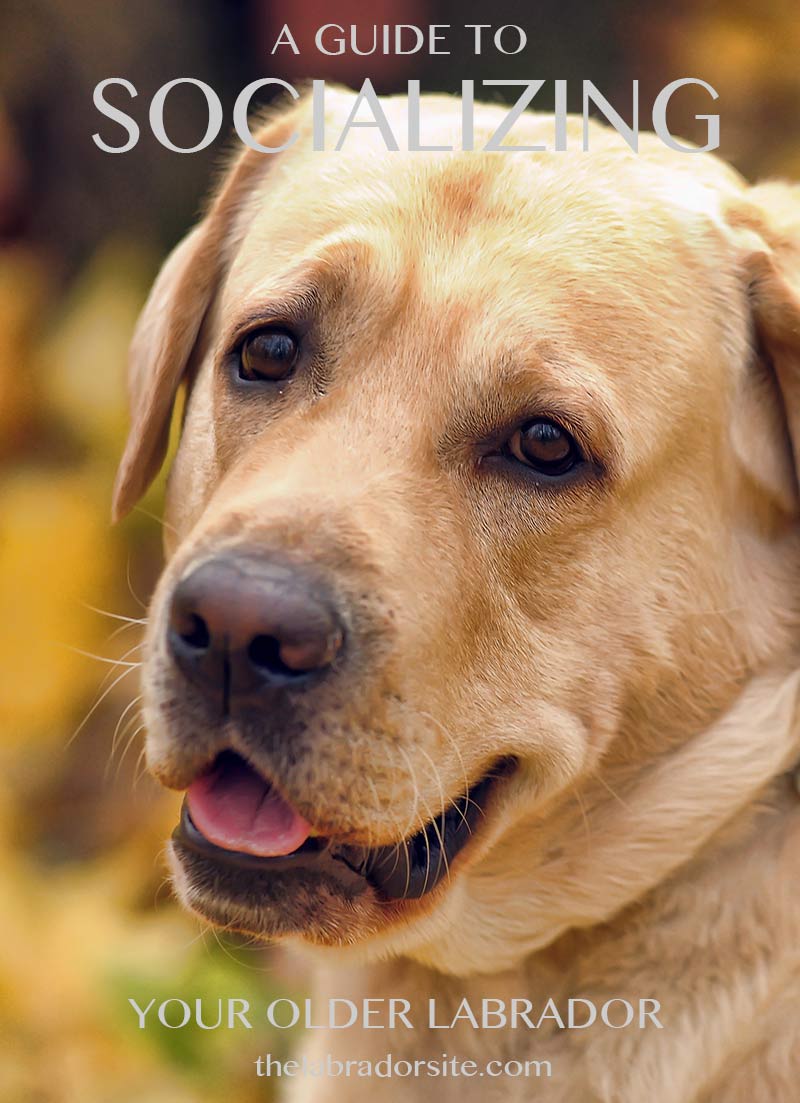
Sometimes disaster strikes a family soon after adopting a Labrador puppy. When bereavements, or serious illness occurs, socialising a puppy may have to take second place to the family’s other needs. A young dog may even be relegated to an outdoor kennel or they yard, or abandoned at a shelter before he is able to adapt to living in human society And finally in some cases dogs are not socialised for anti-social reasons.
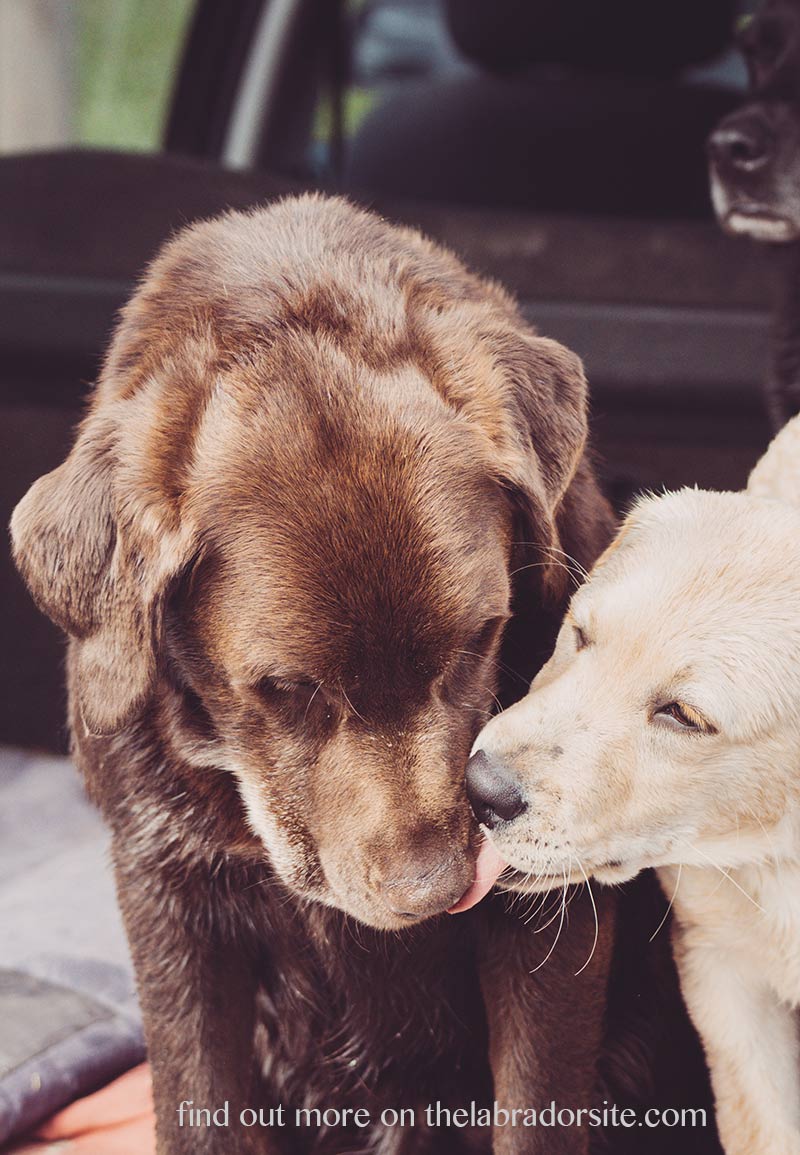
People that like the idea of an aggressive guard dog in and around their home may deliberately avoid socialising their Labrador to ensure that he does not become too friendly.
Socializing adult dogs
Whatever the reasons, some adult Labradors have not been properly socialised. And this is a problem that has to be addressed by the family that owns, or intends to adopt, them. You will definitely need to set about socialising your older dog if for some reason he missed out on this process when he was a puppy. The good news is that a reasonable level of socialisation can usually be achieved with an older dog. The bad news is, that it can take quite a long time.
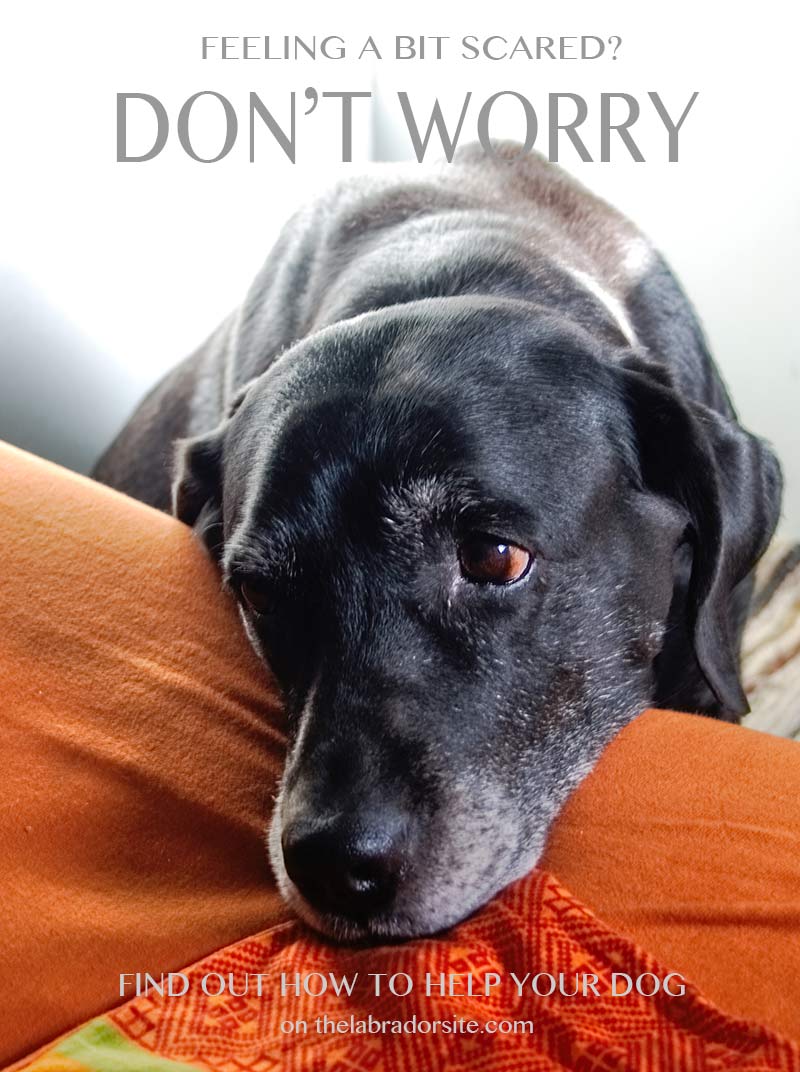
Socialising an eight week old puppy is easy because he has litte fear of strangers and so long as you are near will quickly adjust to new situations. Socialising an older dog requires a lot of patience in overcoming his fears.
How to socialize an older dog
The objective of socialisation is to help the dog feel comfortable in situations that he finds quite scary. These situations will vary from dog to dog. He might be scared of men, of traffic, of washing flapping on the line, of loud noises, or trains, or other dogs. Or all of these things.
With puppies, we tend can socialize them quite quickly, exposing them to many new situations at once. This is because the fear of strange situations hasn’t fully kicked in when most of us bring our puppies home to live with us.
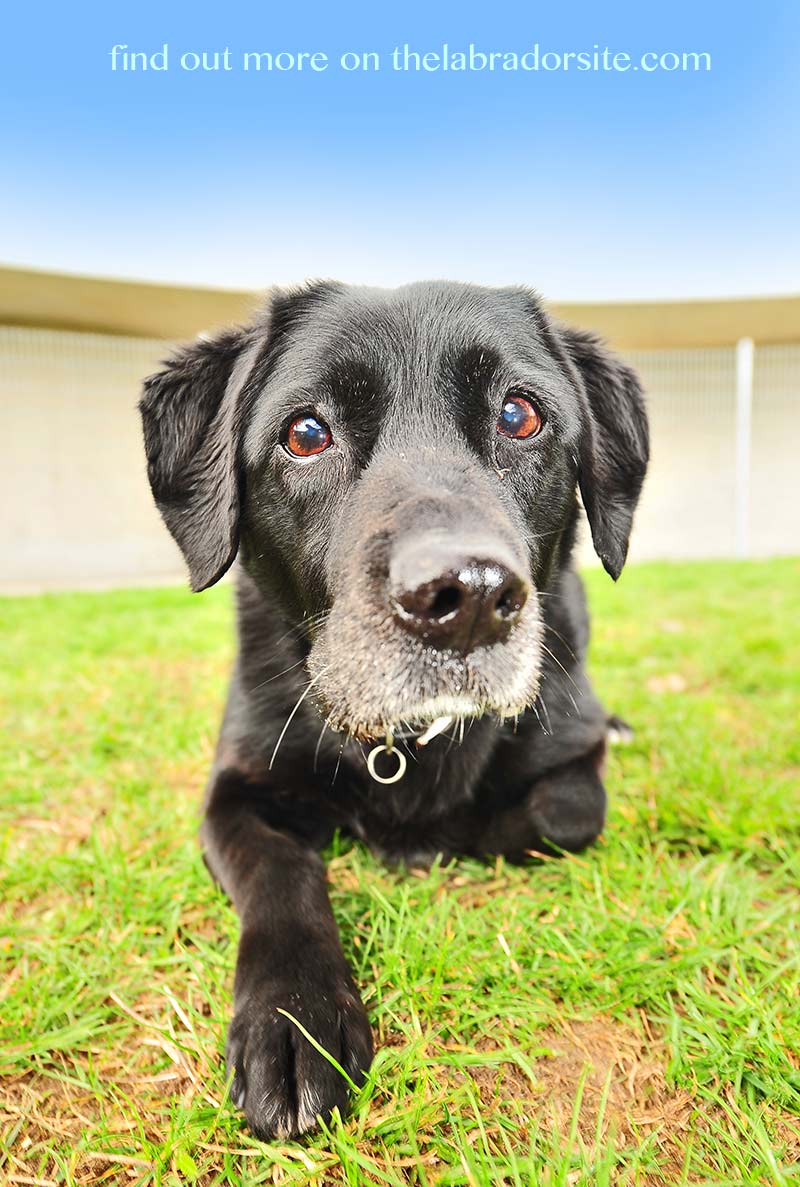
As long as a very young puppy is near to you, he is likely to feel fairly safe. With an older dog it’s different. He is already scared. You being next to him won’t remove that fear entirely. And you may not be able to pick him up in your arms, and comfort him. So you are going to have to take things more slowly
Socialize an older dog one step at a time
Try and pick one thing at a time and work on that. Introduce the scary situation at such a great distance, or at such a low intensity, that it is no longer scary. If your dog is terrified of traffic for example, try to find a park or a large piece of open ground with a road running along just one side.
Spend time with your dog as far away from the traffic as possible, encouraging him to relax and eat or play, whichever impresses him most. Don’t go any closer to the road until he is comfortable at a distance. Don’t rush things. This could take weeks of daily outings.
Socializing an adult dog with food and fun
It is fine to use distractions to take the dog’s mind off whatever he is afraid of. Food is a helpful tool and being regularly fed in situations that used to make your dog feel uncomfortable is a great way to help him overcome his fear. Some dogs respond better to games – if your dog would rather fetch a ball than snack on hot dogs, that’s just fine.
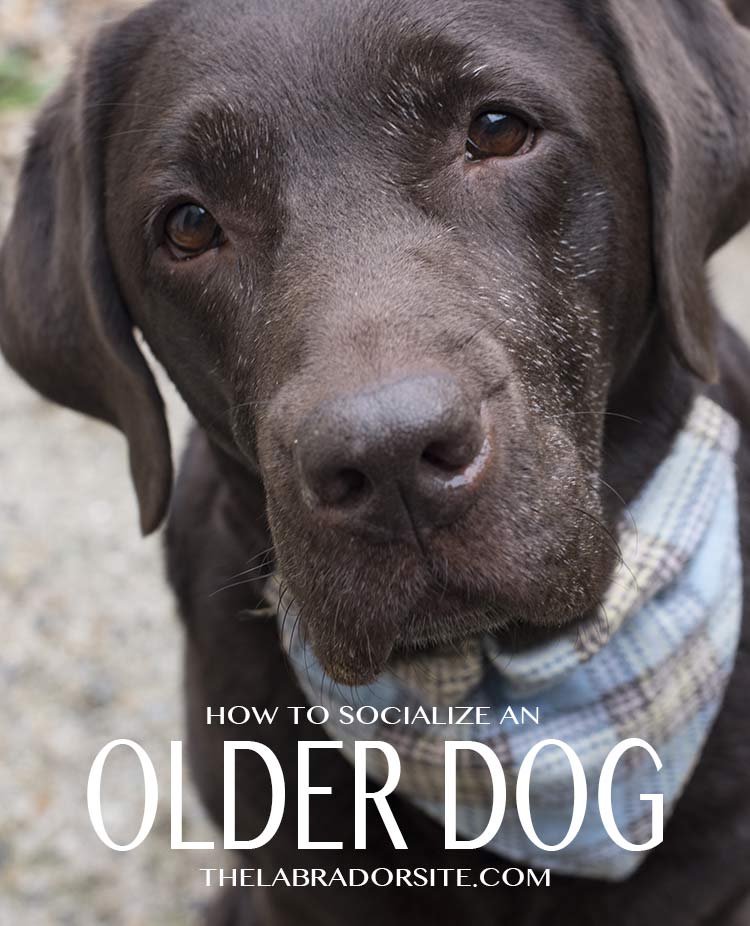
Socializing adult dogs – safety rules
Fear is a leading cause of aggression in dogs. Poorly socialised dogs are afraid. They are often afraid of so many things that simply venturing outside the home is extremely stressful for them.
Never underestimate the capacity of a frightened dog to bite. No matter how great he is at home with your family. And never throw him in at the deep end of his fear, in the hopes that he’ll ‘just get used to it’. You could end up making the problem much worse, and even tip him over the edge.
Don’t try to overcome aggression using ‘dominance reduction techniques. These can be extremely dangerous and are likely to end up with someone getting bitten and the dog being destroyed.
Help and support
Socialization is about introducing an animal to an unfamiliar or scary world in gentle stages. Severely fearful dogs or dogs that seem to react aggressively are very vulnerable during this process. And so are the people around them.
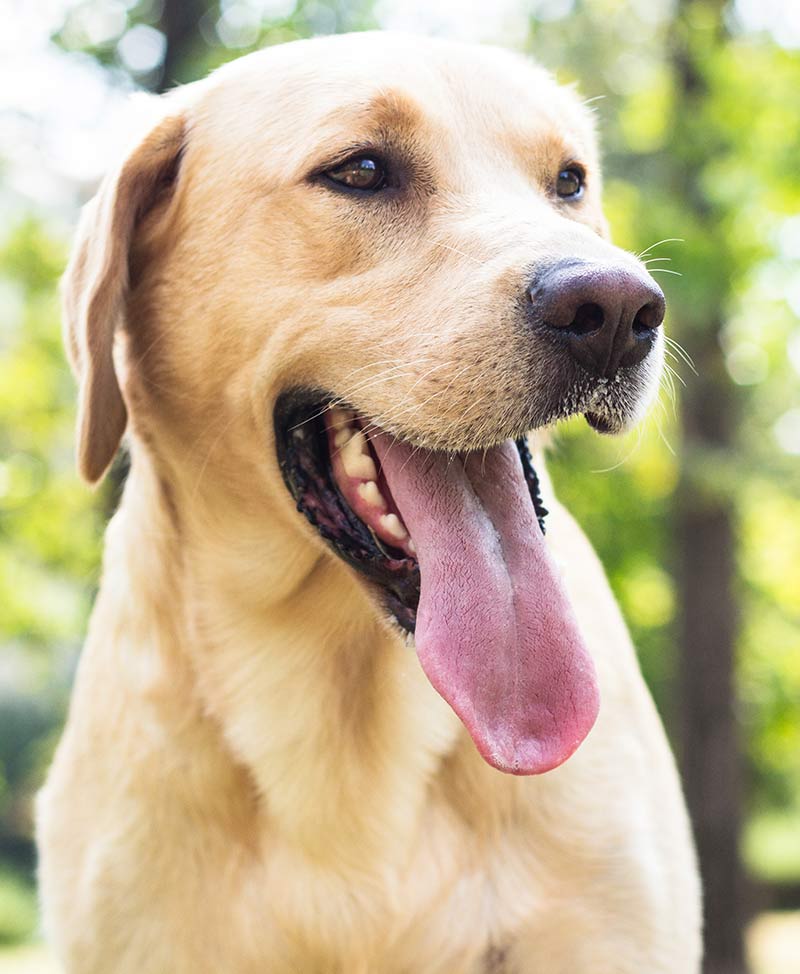
Unless you are very experienced and knowledgeable it is a good idea to enlist some help at the start of this process. Sometimes a dog is aggressive for reasons other than holes in his socialization. Dealing with aggression and identifying the cause is a specialist subject and if your dog is becoming aggressive you really need to seek the help of a qualified behaviorist. Your vet should be able to recommend one. He will also be able to check your dog over to make sure there are no physical reasons for aggression.
In some situations a muzzle can be helpful, it enables the owner of the dog to relax knowing that his dog cannot bite or hurt another dog or other people. A relaxed owner is in a better position to help the dog relax too. A behaviorist will be able to advise you if this is an appropriate tool for your dog. He or she will also be able to give you practical advice on dealing with difficult situations, and techniques you can use like the following food scattering method.
Deflecting other dogs
A dog that is frightened of other dogs may be helped if you carrying a small bag of dry dog food with you. Not to give to give to your own dog, but to deflect approaches from other dogs You can scatter the food on the ground when other dogs show an interest in approaching yours. This tends to divert their attention away from the frightened dog and can enable you to move your dog further away from the source of his fear.
Planning how to socialize an older dog
It is well worth planning your older Labrador’s socialization in advance, and keeping a record of what you attempt and achieve each day. Not only because this helps you cover all the bases, but because it helps motivate you by letting you look back and see how far you have come.
When you are attempting a long drawn out process, it can feel as though you are making no progress at all. A written record shows you that you are actually doing much better than you were a month or so ago. Write down all the things your dog is scared of. Anything that makes him ‘stiffen’ , growl, cower, hide, should be noted. Tackle his fears one at a time. It is a big task that you are undertaking but in many cases you will see steady progress as the weeks and months pass by.
How to socialize an older dog – a summary
It isn’t unusual for an older dog to have missed out on some aspects of socialization when he was growing up. Helping him to feel comfortable in situations that were once stressful for him will improve his quality of life. It will also enable you to take him with you more often and to have more fun together
Socializing adult dogs can be challenging. It takes time and patience and you may need professional help at times. But the rewards are well worthwhile, and in the weeks to come you will have a great sense of pride in what you have achieved for your dog.
Your dog?
Have you socialised an older dog? A rescue dog perhaps? Let us know of any tips and advice you have for others in the comments box below.

Free Labrador Updates!
Get my training tips, news, reviews, and the latest from The Labrador Site delivered to your inbox



Thank u for sending help for my labrador retriever. Your advice is helping. My Rosie is 12months. I’m training her to be my assistant dog as I have osteoarthritis in my spine. She is doing really well. We have a bit of a problem Rosie jumps at other dogs and barks. She doesn’t like little dogs and is difficult to hold if she see any. We carry treats and talk to her if she is good. But people think she is aggressive when she jumps and barks. I have sent for your book. I’m a pensioner and can’t afford a dog trainer. So I’m hoping your book will help. Thank you. What I have read about you. You sound like a super person. God bless xx
Hi Julie. Thank you for your kind words – I’ve passed them on to Pippa – we’re so pleased you’re finding her articles helpful ❤️. It sounds like you might find this article useful too: https://www.thelabradorsite.com/no-more-jumping-up/ – I do hope it helps you with Rosie’s jumping up.
Sammie 🙂
I have a 1.5 year old black lab . Got him from a friend at 8 weeks old . Took him everywhere with us and around all of our friends to socialize as much as possible. As a puppy and even now he is literally terrified of everyone. Even people we raised him around . Of course he is super attached to me and the members of our household (kids, spouse) but anyone outside of us and he will flip out . He pants , paces and a lot of times will express anal glands if he thinks someone is coming close to him . We’ve tried slowly trying to make him comfortable company . Used treats , having them just ignore and trying to let him settle into it . And still nothing works . He will frantically pace back and forth . I don’t know how else to help him . He’s got such a funny and goofy personality with us and I want others to be able to play and see that side of him to . But I’m starting to think that may never happen .
I purchased a 2 year old Japanese chin from a breeder. I thought she was knowledgeable; however,when I took the dog for a vet visit, he had infections in both of his ears, costing me $200.00. I have just recently realized how frightened he becomes over small changes. It makes me feel sad. I think over time, it will get better. Still, I do not understand how any breeder could have missed this crucial step.
I have been in the process of adopting a rescue. 4 maybe pushing 6 month yellow lab/husky? mix. He loves our chihuahua/terrier Lily, but is terrified of both me and my 22 year old daughter. I have been trying advice from youtube videos, but I don’t seem to be getting anywhere with him. His trial period is ending on Saturday at which time I have to make the decision to either keep him or return him to the rescue shelter. Pleas help, I was not expecting an over night miracle, but I was hoping to see an improvement.
My dog a Staffie cross terrier is turning 11 this year, he has poor socialization skills his whole life with other dogs. We took him to an open dog training preschool when he was a Pup but I think that was a bad experience for the both of us, there were some large loud dogs there and I feel like he’s just mimicked their behavior ever since. If he sees another dog across the street or even hears them he wags his tail madly, paces around the house and barks quite loudly, sometimes making whimpering noises- if we get closer he might try and fight the dog or bite them.
Please help, I have no idea how to help socializes him.I just want him to be hapy in his old age.
I have a 3 year old whippet. I’ve had him since he was a puppy and he was well socialised until when he turned 1/6 year old, while we were walking in our neighbourhood, three dogs approched to us without leash and they were barking and screaming at us, one of them lunged at my dog and bite him. They came out from someone’s front garden but it didn’t have a fence nor their owner to stop them. My dog got really upset and scared, he started to bark mad as well.
Since then he barks aggressively at other dogs whenever he sees one. Is there any way to help him?
Hi Mia, I have just read your post regarding your whippet, the same thing happened to my well socialised Labrador, when she was attacked by a Staffy, she was bitten on her nose and neck, she is now 7 years old and is still afraid of other dogs. It left me traumatised as well. We both live with this, as she is obedience trained and has had Gundog training also she is very obedient in every other way, this helps a lot in managing her fear aggression. when she feels threatened and at the very first sign I put her very quietly and gently into the sit position, using a tasty treat until the danger has passed, I give her the treat and move on. The timing is crucial. After managing this for 5 years now I am quite good at reading the signs.
We will never be able to let her socialise with dogs she does not know, but she does still see her sister and lives with an older lab, so she does get to play with them. I feel it’s the best we can do to help her.
If you have any other tips on this subject I would love to hear from you.
We are working on socializing our Basset/maybe Lab? mix that is just over a year old. He has many people he is familiar with, goes to several different places, but they are the same many people and different places. Due to family illness, we have fallen behind on socializing. So, we are back in the saddle again going for walks in the neighborhood with lots of his favorite high value treats and trying short trips to dog-friendly stores. However, when we are in the stores, if someone new approaches him, he seems scared. I try to feed him the super high value treats in those instances, but he often won’t take the food. Am I pushing too much too fast? It is hard not to lose hope at times! On walks, he will take the treats and we slowly move past people standing in yards. Or we stay seated while people pass us, all the while feeding lots of treats. Tips? Thoughts?
How do I correctly crate train our Shi tzu yorkie at night when she’s used to free reign of the house at night. We discovered she pees in the house at night. We’ve tried unsuccessfully to crate her at night keeping us awake for nights on end with barking or whining till we give up.
Distance and distractions are your best friend. While it has already been covered in the article, this cannot be emphasized enough.
Keep in mind that it must be done. To have a truly obedient dog, the dog must be able to perform in all environments.
Take your time, reward for each advancement, do not get discouraged during setbacks and don’t ever let your dog see that you’re discouraged. It’s far better to stop and start again another day than it is to try to push through it. For those who know enough about training to know the standard is correction and reward, I would suggest no correction in this instance. This is one that I would pursue as fully energetic and reward. Make it as upbeat as possible. Best of luck!
My lab, Sierra, is a 6 month old pup and she is very unfriendly to strangers. She growls at even friendly strangers when they approach her with treats. We have a party this weekend and I don’t know how to handle her when there would be so many people as she doesn’t listen to me even when I offer her treats. What should I do ?
I have the same problem. How is your puppy now? Any tips?
Take her to a children’s play area on lead. Let her watch and listen to their noises and excitement from quite a distance away if you can do this several times in a week. Watch her energy level and when she can sit comfortably watching them. Move her forward towards them a little at a time until she can sit watching them in a calm way this could take several weeks. Do not comfort her or talk to her during this time eventually she should be able to walk past a child and feel comfortable
I adopted a labxrottie rescue dog aged 3 he is a big dog. At the rescue centre it took 3 men with leads to get him into my car to go home he was terrified of everything birds noises people dogs etc turns out he had been kept in a crate in a dark outhouse since he was a small pup. The owners were prosecuted. He has been with me just over a year and with patience, consistency and calmness he has overcome nearly all He is still male aggressive but working together we will get there. I am writing this to help others who think they are taking two steps forward and one back
It will come right, it is a very slow process but to see your dog finally learning to be a more confident and happy dog makes it very worthwhile
I adopted Emma & bell, labs , sisters! Both were socialized also at the time I adopted, about3-4 months, at 11 months now, Bell is still social, not afraid of anything, Emma is not social and scared of everything!! She barks, growls and scares people, especially kids! I’m puzzled!! So I’m going to have my vet re-examine her and talk to her about it! Good luck! I want her problems fixed! I try and take them with me everywhere but Emma is making it hard!!
My lab is afraid of strangers. From 9 weeks old several times a week i took her to public places and she showed no fear. Now she is 9 months old and for the last two months she shows fear of even friendly people even though i give them treats to give her. She is especially afraid of children. Any advise?
I read somewhere that it is better not to get the strangers to give the treats – the dog is then being encouraged by the food to go closer than they are comfortable with, which can actually make things worse. The advice I read was for the dog parent to give their scared dog really yummy treats (keeping at a distance they are relaxed at) – thus starting to create a positive association. The dog shouldn’t be appearing scared at all if you are a distance they are comfortable with. Back off if they are.